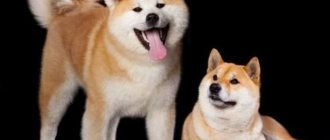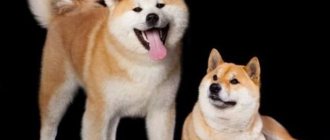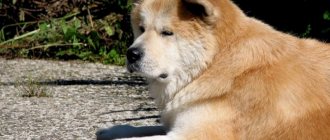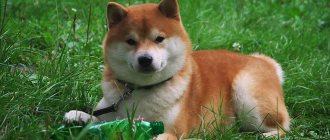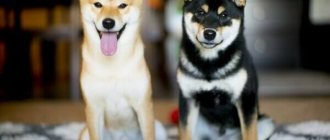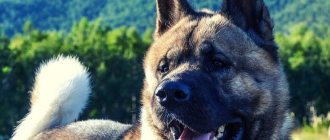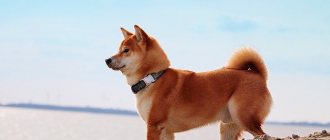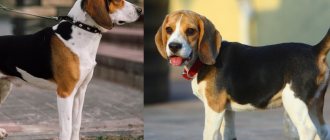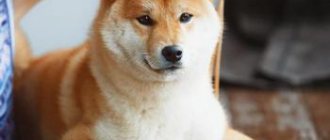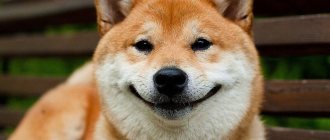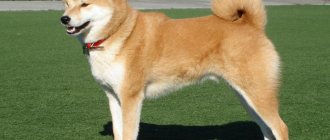Origin of the Akita Inu and Shiba Inu breeds
Many dog breeders are ready to give any money for breeds that were not created selectively, but were bred by nature itself. The first remains of these dogs were buried and found 8 thousand years later. Archaeologists are still finding evidence of the ancient roots of the Akita Inu. Mentions of this breed are also found in the scrolls of ancient civilizations in Japan, where it is said that the Akita Inu guarded the home and served its owner throughout its life.
Important! If we compare the pedigrees of the Akita Inu and the Shiba Inu, the former is more significant and more honorable in Japan since ancient times. Over time, government principles have changed in the land of the rising sun, and prices for breeds bred artificially and those donated by nature have almost become equal. But most of the Japanese, having decided to have a pet, choose the Akita Inu, since its pedigree has already been tested by time and symbolizes the honor of the family.
The Shiba Inu breed was created and bred by Japanese monks to guard monasteries. She looks less like an Akita Inu. They wanted a good, small-sized guard who would be quiet enough not to be intimidating and would maintain a monastic atmosphere. The Shiba Inu is considered hardy and easily covers long distances; the monks raised him as a hunter, which also played into their hands.
Akita Inu
Health
Akita and Shiba are considered long-lived. The difference is in life expectancy: Akita 11-12 years, Shiba - 12-15 years. The list of characteristic diseases includes food intolerance (allergies); skin diseases caused by allergies; hip dysplasia; diseases of the digestive system.
Routine vaccinations are mandatory. They are the same for Akita and Shiba. Vaccination against dangerous diseases such as rabies and plague will protect pets from fatal diseases. An unvaccinated dog poses a threat to the lives of other animals and humans.
Appearance Difference
Despite the similarity in the color of the coat, as well as the entire structure of the body, there are still external differences. By themselves, Akita Inu dogs are larger and heavier than representatives of the Shiba Inu breed.
Characteristics of Akita Inu Shiba Inu
| Characteristics | Akita Inu | Shiba Inu |
| Height | 70 cm | 40 cm |
| Weight | 40 kg | 9 kg |
| Wool | Thick and coarse, the undercoat is voluminous but soft | The undercoat is thicker than the main coat. The coat is short and moderately hard |
| Eyes | Eye color brown | Brown eye color |
| Legs | The hind legs are longer than the front legs at the hip | Paws are the same length |
| Tail | Long, tightly twisted into a circle | The tail is voluminous and fluffy, curled into a circle |
| Frame | Small, the neck hardly stands out | A small, smooth transition from head to body. |
| Muzzle | Pointed, fox-like | Pointed, slightly wide skull |
| Ears | Triangle shaped | Triangle shaped ears pointing up |
Important! Beginners in dog breeding may also confuse these two breeds due to the fact that the dogs have a similar coat to the touch.
Shiba Inu
Comparison of characters
The Akita Inu breed is considered not aggressive, but it is also difficult to call it playful. A dog of this breed will not run after a stick or a ball; rather, he will prefer to guard the front doors of the house. They are peaceful and are not provoked by children or their relatives. Some dog breeders consider this breed to be one of the best breeds suitable for children.
It is worth saying that the Akita Inu is more suitable for schoolchildren, and not for younger children. Preschool children are known for their clinginess, which the Akita Inu does not like, but he will not respond with aggression; most likely, he will hide, away from the conflict. This breed is loyal to its owners, capable of restraining its emotions, and is considered the best ally in the family.
As for the Shiba Inu, this breed is the opposite of the Akita Inu. These dogs are playful, happy to run with a child, frolic with a stick and will feel great in the fresh air. It is worth noting that in the dwarf breed there is a chance of aggression on the part of the dog, but it will be directed at the offenders of the owner or at relatives or other animals who bully the dog.
Shiba Inu
This is partly the influence of the ancient roots of the breed, but over time the dogs have learned to turn aggression into games and get rid of it in the process of active entertainment. Therefore, before getting a Shiba Inu puppy, you need to make sure that daily walks in the fresh air will be organized for the dog.
The Shiba Inu has high intelligence and developed sensitivity. When the dog wants to play, he independently brings the toy to the owner; he does not like it when his toys are touched. The nature of the Shiba Inu is similar to that of small children; they are just as playful, lively and positive.
Attitude towards children and pets
Akita Inu shows in its character the abilities of a brave protector and a loyal friend. In addition, this breed will always treat children as equals, and accordingly, it will play with them like with puppies, and this does not always end without bruises or abrasions.
That is why dog breeders recommend that families without children or families where children already go to school get a puppy of this breed. Akita Inu is also lenient towards animals in the house. She cannot be called a conflict dog and the one who gets into a fight first. Her character is to protect the house, not to hunt.
Akita Inu
The Shiba Inu will be happy that the owner's child threw him a stick and is playing with him in the park. Playful by nature, they will never offend their family in the excitement of having fun. They are sometimes capable of being cunning and whining on purpose, begging for treats from children, and not from adults. It is harmless for children of any age.
As for pets that the little Shiba Inu will interact with, there shouldn't be any. If they are, then the owners are guaranteed daily clashes and loud barking in the house. Also, a Shiba Inu will not ignore a dog fight on the street; it is his duty to hunt and emerge victorious, alas, but this is his nature. You can raise and train a dog of this breed, but it will never forget its ancient purpose.
Suitable nicknames
Each owner chooses a name for his four-legged companion. If you just can’t decide which nickname is most suitable for the purchased Shiba Inu puppy, then you should familiarize yourself with a small list of popular options.
The following Japanese names are suitable for a boy:
- Giro;
- June;
- Iori;
- Yoshi;
- Keogh;
- Aki;
- Aiko;
- Kumo;
- Mitsu;
- Kumi;
- Kumiko;
- Momo;
- Mori;
- Ricky;
- Rheas;
- Suzu;
- Mimi;
- Tenshi.
If you are looking for a suitable nickname for a female dog, then the following interesting nicknames may suit her:
- Akiro;
- Keen;
- Sengo;
- Kay;
- Kam;
- Mizuki;
- Minori;
- Fuji;
- Mineco;
- Izumi;
- May;
- Toshi;
- Suzu;
- Hoteru.
Differences in maintenance and care
Dogs of the Akita Inu breed have their own number of features in care and maintenance:
- They need to be combed twice a week.
- You need to wash and clean your ears 2-3 times a week, depending on the degree of contamination.
- It is recommended to wash your dog no more than 2-3 times a year with shampoo and other care products.
- You need to walk your Akita Inu twice a day for at least an hour. In addition, walks should be organized in a forest or park where there is clean air.
- The Akita Inu's digestive system is not accustomed to fatty meats, sweets and starchy foods; these foods should be excluded from the dog's diet.
- The body of this breed digests vegetables, rice, seafood, fish and fruits well. All this is the result of his Japanese origin.
- Over time, the Akita Inu has adapted to the cuisines of different countries, so foods can be included in their diet: lean veal, chicken, broth, cereals and dairy products.
When it comes to feeding, Shiba Inu and Akita Inu are similar. Shiba Inu should also not be fed fatty, sweet or starchy foods, nor should they be given dry food. As for the walking regime, the Shiba Inu breed needs long two-hour runs or active games twice a day.
Shiba Inu
The only problem that Shiba Inu owners will face is the love of shoes. But an ordinary toy that the dog could chew anywhere will help solve it. A dog of this breed needs care for its fur, which is very thick. It must be combed twice a week with special combs.
What are the similarities between these breeds?
The similarity of these breeds lies not only in external characteristics, it also affects the character that they inherited from their ancestors. The dogs have the same thick coat that requires constant grooming, ears are triangle-shaped and tapering towards the top, and the coat color of both breeds is a soft beige color.
Also, one cannot help but mention the strong paws, tightly curled tail, and similar eye color. The Akita Inu has a calmer character, while the Shiba Inu has a playful character, but the similarity is manifested in the fact that the second breed was formed from the first. Therefore, their loyal, courageous and benevolent disposition cannot be called different.
Akita Inu
Comparison of prices for puppies
The pedigree of both breeds, going back to the time of the samurai, does not make it possible to purchase a puppy at a low price. If we talk about truly Japanese breeds, without other breed admixtures. On the puppy sales market you can often find Akita Inu or Shiba Inu puppies being sold for 5 thousand rubles or less.
It is necessary to remember that in order to take a real dog with real Japanese roots of one of these breeds outside the borders of Japan, and even legally, you need to collect a lot of documents, pay a lot of expensive duties, all these points simply will not allow the breeder to sell puppies at such a low price.
Most likely, a puppy offered as an Akita Inu for such a price will be obtained by mixing similar breeds. The buyer may not notice this immediately, but only after a while, when he does not notice samurai behavior in the character of his pet and is susceptible to aggression from the dog.
Shiba Inu
Therefore, those who want to buy a real Akita Inu or Shiba Inu with true Japanese roots choose good kennels that have all the documentation confirmed on the other hand. In addition, puppies will cost about 30-70 thousand rubles , depending on what awards his parents or ancestors have. Therefore, when purchasing puppies of these breeds, you should carefully consider the choice of kennel and dog breeder.
Attitude towards children and pets
An Akita will be very tolerant of children if they have lived together since childhood. With the right approach, purebred dogs will become faithful companions for children over 8 years old . When interacting with a younger child, this breed does not perceive sudden movements and noise well, so they can often show aggression and self-defense in response to unexpected movements.
Important!
Dogs have a good memory, which is why they remember the slightest offense towards a child (pushes, tugging, blows). The Akita Inu is even more hostile towards other dogs: it always tries to dominate the dogs, which is why conflict situations arise.
Shiba Inu will be more subtle psychologists, capable of perfectly studying the characters and habits of the surrounding household members. Despite their blind love for their owner, pets are wary of physical contact (stroking, attempts to put on a collar, etc.), responding with an indignant howl to any attempts. To avoid such a reaction, your four-legged friend needs to be taught affection from an early age.
For children they can become nannies and companions. Dogs are hostile towards strangers , although they will not show aggression without reason. But they find it difficult to get along with other animals and often show jealousy (especially with cats).
Who is the Shiba Inu suitable for?
Although the Shiba Inu looks similar to its relative, the Akita Inu, in terms of behavior they are completely different breeds. Before getting a Shiba Inu pet, you need to consider the following factors to determine whether the future owner is ready to keep and care for a Japanese dog or not:
- The owner should have free time that he can devote to the pet. Shiba Inus can be jealous and a little selfish due to lack of attention. If you don’t play with them and don’t spend time with them, then they will misbehave in the house: chew shoes, tear up wallpaper, and disobey the owner’s commands.
- If the breeder leads a sedentary lifestyle while at home. This dog breed loves active games and fresh air. Shiba Inu needs long daily walks in the morning and evening to ensure that the coat remains healthy and shiny, and the dog feels good.
- The future owner of a Shiba Inu must have a strong character who can say “No”. This is necessary so that the pet accepts superiority over itself and is able to listen to commands.
- The presence of other pets in the house will alarm the Shiba Inu. Since this breed is jealous and can experience this feeling towards the owner.
Therefore, if a person leads an active lifestyle, has free time and loves animals, and is also ready to devote his time to them, then the Shiba Inu will be happy being in this family, where his physical characteristics will be maintained.
Shiba Inu
Temperament
Akita Inu are more obedient and loyal dogs. They become attached to their owners for life and are ready to defend the honor of their breadwinners to the last in case of danger. Many dog breeders claim that these dogs help people cope with severe stress and psychological disorders.
The Shiba Inu is a disciplined breed. Its representatives are characterized by such character traits as:
- possessiveness: dogs do not like to share the owner’s attention with someone else;
- activity.
- curiosity.
- discipline.
Shiba Inu are highly intelligent dogs. They can stand up for their owner and themselves. Animals have a more rebellious character, however, they are not aggressive.
Who is the Akita Inu suitable for?
The Akita Inu is very popular thanks to a movie that talks about the loyalty of this breed. But not all breeders know that this quality must be cultivated in a dog, for which it is necessary to establish contact with the pet. If the owner fails to cope with this, then the pet’s actions can be unpredictable for him, despite the fact that the Akita Inu differs from the Shiba Inu in a rather calm disposition. To do this, it is recommended to weigh and evaluate your capabilities before purchasing such a puppy.
- Fresh air is of great importance to the Akita Inu. She will not run after a stick, but a quiet walk next to her owner will be happiness for her.
- The Akita Inu breed has a calm and gentle disposition; it is a guard dog that will never be the first to get into a fight, unless, of course, it concerns a threat to its owner. Therefore, she will feel good being in the same house with children who will not bother her and with pets. The Akita Inu literally avoids any conflicts.
- In order to be the owner of an Akita Inu you need to have a persistent character. So, the dog will feel firmness on the part of the owner and will accept him faster.
If a person wants to buy an Akita Inu puppy, he must understand that the pet will not happily run after a stick or toy in the park, and it will also not tolerate pestering other pets or small children. For such a breed, it is good if the family has older children of school age who could walk and spend time with him.
Akita Inu
The Akita Inu and Shiba Inu breeds, despite their external similarity, differ in character. The first was a faithful watchman, and the second was taken out for hunting. Accordingly, the conditions for their existence differ. The Akita Inu needs its own personal space, where it can observe everything that is happening in the house, and the Shiba Inu cannot be happy without active walks in the fresh air.
In order for the pet to be happy and make its owner happy, the conditions for all family members must be met in the house; if this is not possible, then it is better to completely put aside the idea of buying a puppy of one of these breeds.
Who is better to choose?
The strong similarity of the two breeds often gives rise to the question of who is better to have, an Akita or a Shiba. When choosing, you need to focus on many factors: place of residence, free time, physical activity, training experience, presence of animals and children.
Akita Inu will be an ideal choice for people:
- living in a private house;
- having no animals or children;
- able to devote a lot of time to the pet;
- looking for a dog to be a guardian and a hunting assistant.
In turn, the Shiba Inu is perfect for those who:
- lives in an apartment;
- physically active (this will be needed during walks);
- able to show patience in training or already has experience;
- contains other animals;
- raises children.
Expert opinion Anna Abramenko An avid dog lover. Experience in veterinary medicine since 2009. This comparison is conditional. Both breeds are active, friendly, and strongly attached to their owner. A dog's behavior depends, first of all, on the quality of its upbringing. Even the most restless puppy can be turned into an intelligent and patient animal with the help of training.
Future owners should approach the choice of a puppy responsibly. Under no circumstances should it be presented as a gift. Each person must make his own decision about the degree of responsibility he is willing to assume.
